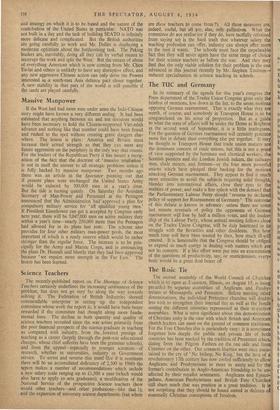The TUC and Germany
In its summary of the agenda for this year's congress the Press department of the Trades Union Congress gives only the briefest of mentions, low down in the list, to the seven, motions opposing German rearmament. That is exactly what they are worth, of course, and somebody in Transport House is to be congratulated on his sense of proportion. But as a guide to what the state of affairs will be under the Dome at Brighton in the second week of September, it is a little inadequate. For the question of German rearmament will certainly generate more fire in debate than everything else put together. It may be thought in Transport House that trade union matters are the dominant concern of trade unions, but, this is not a point of view supported by the furniture and chemical worker,, tho Scottish painters and the London Jewish bakers, the railway- then, shale miners, and firemen—or the four more powerful unions 'which have pledged their backing for the motions attacking German rearmament. They appear to find it much more attractive to avoid the subjects requiring solid thought, blunder into international affairs, close their eyes to the ; realities of power, and make, a fine splash with the demand that the Parliamentary Labour Party should ' reverse its declared policy of support for Rearmament of Germany.' Th'e outcome of this debate is known in advance: unless there arc some • last minute reversals of policy the opponents of German rearmament will lose by half a million votes, and the leader- ship of the Labour Party, whose anhual meeting follows close on the Trades Union Congress, will be duly heartened in its struggle with the Bevanites and other dissidents. But how much time will have been wasted by then, how much created. It is lamentable that the Congress should be obliged to expend so much energy in dealing with matters which are not its concern. If a like effort were put into an examination of the questions of productivity, say, or restriction ism, ery4 body would be a great deal better off.


































 Previous page
Previous page